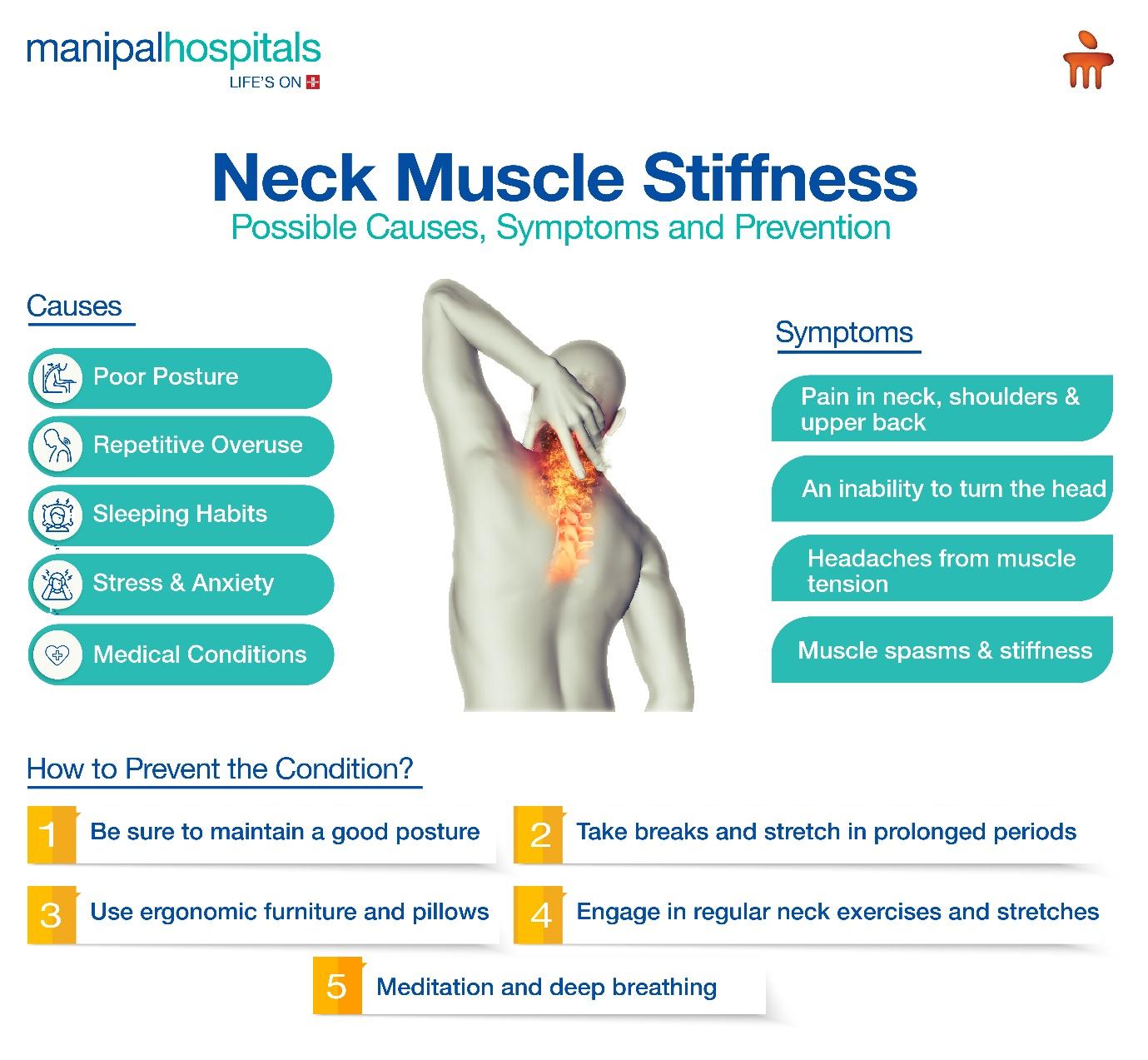
Have you ever woken up with a stiff neck, making the simplest of movements feel like an arduous task?
Well, if the answer is yes, you are not alone. Neck muscle stiffness is a common ailment that can disrupt our daily lives, hindering our ability to perform routine activities with ease. From turning your head to check blind spots while driving to simply nodding in agreement during a conversation, the impact of neck muscle stiffness is pervasive. Let’s explore the intricacies of neck muscle stiffness, knowing its causes, effects and most importantly, effective treatment to untangle the knots.
Synopsis
What is Neck Muscle Stiffness?
Neck muscle stiffness, often referred to as a stiff neck, is characterized by discomfort and reduced range of motion in the neck. It occurs when the muscles in the neck contract involuntarily, causing tension and limiting movement. This condition can affect various delicate areas, including the muscles, ligaments, and tendons surrounding the neck and shoulder region.
Delicate Areas Affected
The delicate areas most commonly affected by neck muscle stiffness include the trapezius muscles, levator scapulae, and sternocleidomastoid muscles. These muscles play a crucial role in supporting the head and facilitating neck movements. When these areas experience tension and tightness, it can lead to a stiff neck and shoulder, causing discomfort and inconvenience.

Possible Causes and Symptoms
Neck pain causes
-
Poor Posture: Prolonged periods of slouching or maintaining an incorrect posture, especially while sitting at desks or using electronic devices, can strain neck muscles and contribute to stiffness.
-
Repetitive Overuse: Engaging in activities that strain the neck muscles, such as holding a phone between the ear and shoulder or reading in bed for extended periods, can lead to overuse and subsequent stiffness.
-
Sleeping Habits: Awkward sleeping positions or using an unsupportive pillow can cause strain on the neck muscles, leading to neck hurting after sleeping causing stiffness.
-
Stress and Anxiety: Emotional stress and anxiety contribute to muscle tension throughout the body, including the neck, resulting in stiffness and discomfort.
-
Underlying Medical Conditions: Conditions such as cervical spondylosis or herniated discs can affect the structural integrity of the neck, leading to chronic muscle stiffness.
Neck Pain Symptoms
-
Intense pain and discomfort in the neck, shoulders, and upper back.
-
An inability to turn the head due to a limited range of motion.
-
Headaches, often originate from muscle tension.
-
Muscle spasms and stiffness may worsen with movement.
How to Prevent the Condition?
Preventing neck muscle stiffness involves adopting healthy habits and lifestyle changes:
-
Be sure to maintain a good posture while working and sitting.
-
Take breaks and stretch during prolonged periods of sitting or screen time.
-
Use ergonomic furniture and pillows to support proper spinal alignment.
-
Engage in regular neck exercises and stretches to strengthen muscles.
-
Meditation and deep breathing are good methods for managing stress.
When to See a Doctor?
While most cases of neck muscle stiffness resolve with self-care, it's essential to seek medical attention if:
-
The stiffness persists for an extended period.
-
Symptoms such as severe pain.
-
There is a history of injury or trauma to the neck.
-
Underlying medical conditions are suspected.
Consult our physiotherapist in Goa if you need remedies for neck pain and stiffness.
What are the possible treatments?
Stiff neck remedies at Home
-
Use cold or heat packs to relieve the pain.
-
Gentle neck exercises and stretches.
-
Ensure proper sleep posture and use a supportive pillow.
Medical Interventions
-
Physical therapy for targeted exercises and stretches.
-
Prescription medications for pain relief and muscle relaxation.
-
Injections for severe cases.
-
Surgery in rare instances where structural issues require intervention.
Consult our physiotherapy hospital in Goa if you have,cervical pain in neck and need stiff neck management.
Conclusion
Neck muscle stiffness is a common ailment that affects people globally. It not only disrupts our daily activities but causes discomfort and overall well-being. Therefore, it’s important to understand the delicate areas prone to stiffness, identify causes and symptoms, adopt prevention strategies and know when to seek professional help to manage and overcome neck muscle stiffness. A simple change in your daily lifestyle and incorporating these insights can bid farewell to the knots and embrace a more flexible and pain-free neck.
Manipal Hospitals, Goa can also assist with such concerns.
FAQ's
Neck muscle stiffness can limit the range of motion, making routine activities like turning the head or nodding challenging and uncomfortable.
Seek medical attention if stiffness persists, pain is severe, there's a history of neck trauma, or if underlying medical conditions are suspected.
Maintain good posture, take breaks during prolonged sitting, use ergonomic furniture, engage in regular neck exercises, and manage stress through relaxation techniques.
Apply heat or cold packs, use over-the-counter pain relievers, perform gentle neck exercises, and ensure proper sleep posture with a supportive pillow.
Yes, options include physical therapy, prescription medications, injections (corticosteroids), and, in rare cases, surgery for structural issues.



















 5 Min Read
5 Min Read










